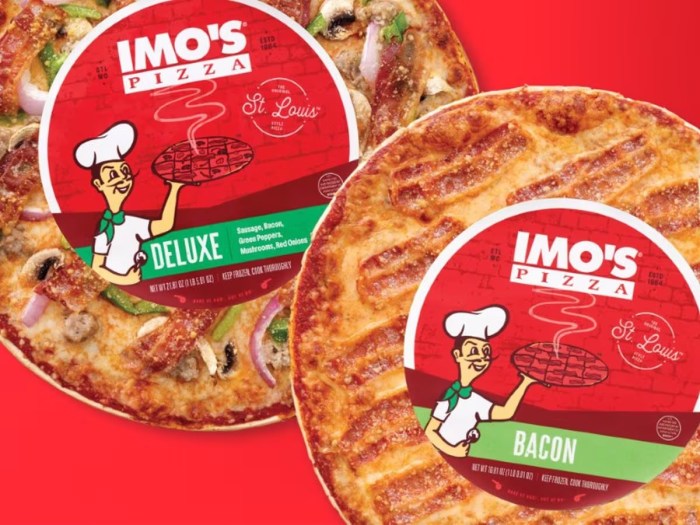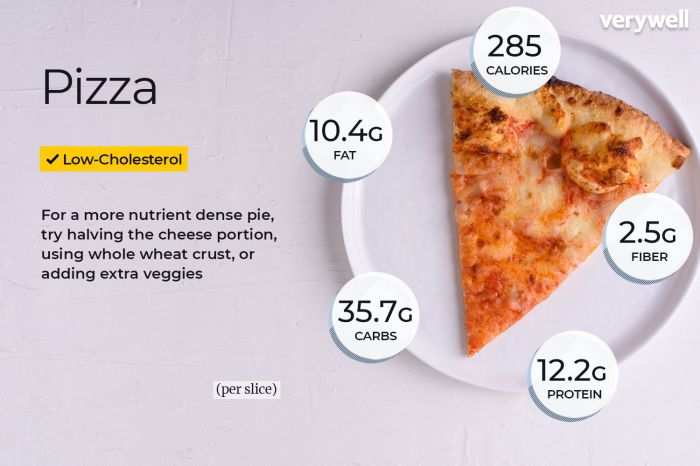Nutritional Composition of Cheese Pizza

Nutrition facts for cheese pizza – Cheese pizza, a beloved comfort food, offers a blend of flavors and textures that many find irresistible. However, understanding its nutritional profile is key to enjoying it mindfully as part of a balanced diet. This section will delve into the macronutrients, micronutrients, and comparative nutritional value of a typical cheese pizza slice.
Understanding the nutritional content of cheese pizza requires considering its high fat and sodium content. A comparative analysis with other popular fast food options, such as the Subway Steak and Cheese, is valuable; for detailed nutritional information on the latter, refer to this resource: nutrition subway steak and cheese. This comparison highlights the varying nutritional profiles of convenient food choices, ultimately informing healthier dietary decisions regarding pizza consumption.
Macronutrient Breakdown of Cheese Pizza
A typical slice of cheese pizza provides a significant amount of carbohydrates, fats, and proteins. The exact amounts vary depending on the size of the pizza, the type of crust, and the amount of cheese used. The following table provides an estimated breakdown for a standard slice:
| Nutrient | Amount per slice (approx.) | % Daily Value (approx.) | Source |
|---|---|---|---|
| Carbohydrates | 25-35g | 8-12% | Pizza crust |
| Fats | 10-15g | 15-23% | Cheese, crust |
| Protein | 8-12g | 16-24% | Cheese |
*Note: Daily values are based on a 2000 calorie diet. Actual values may vary.*
Micronutrient Content of Cheese Pizza
While primarily a source of macronutrients, cheese pizza also contributes some essential micronutrients. These nutrients, although present in smaller amounts, play vital roles in maintaining overall health.Cheese pizza provides small amounts of several vitamins and minerals. For example, cheese is a good source of calcium, important for bone health. The pizza crust contributes some B vitamins, essential for energy metabolism.
The tomato sauce may contain lycopene, an antioxidant associated with various health benefits.
Comparison with Other Fast Food Options
Comparing the nutritional profile of cheese pizza to other popular fast-food choices helps illustrate its place within a broader dietary context.
| Food Item | Calories (approx.) | Fat (approx.) | Sodium (approx.) |
|---|---|---|---|
| Cheese Pizza Slice | 250-350 | 10-15g | 500-700mg |
| Hamburger | 300-400 | 15-25g | 600-800mg |
| French Fries (medium) | 300-400 | 15-20g | 200-300mg |
*Note: These are approximate values and can vary significantly based on specific brands and preparation methods.*
Impact of Different Cheese Types, Nutrition facts for cheese pizza
The type of cheese used significantly impacts the nutritional value of the pizza. Mozzarella, a common choice, is relatively lower in fat compared to some other cheeses. Provolone, for instance, tends to be higher in fat and sodium. Choosing lower-fat cheese options can reduce the overall calorie and fat content of the pizza.
Impact of Pizza Ingredients on Nutritional Value: Nutrition Facts For Cheese Pizza

The nutritional profile of a cheese pizza is significantly influenced by the choice of ingredients. Understanding these variations allows for more informed choices, helping to balance enjoyment with nutritional awareness. Even seemingly small changes, like crust type or the amount of cheese, can have a noticeable impact on the overall nutritional content.
Crust Type and Nutritional Content
Different crust types contribute varying amounts of carbohydrates, fiber, and calories to a cheese pizza. Thicker crusts generally contain more calories and carbohydrates due to their increased size and often higher fat content. Conversely, thin crust pizzas tend to be lower in calories and carbohydrates.
| Crust Type | Calories (per slice, approx.) | Carbohydrates (per slice, approx.) | Fiber (per slice, approx.) |
|---|---|---|---|
| Thin Crust | 150-200 | 20-30g | 2-3g |
| Thick Crust | 250-350 | 35-50g | 3-5g |
| Deep Dish | 300-400+ | 40-60g+ | 4-6g |
*Note: These are approximate values and can vary significantly depending on the specific recipe and ingredients used.*
Tomato Sauce’s Nutritional Contribution
Tomato sauce, a seemingly simple ingredient, adds important nutrients to cheese pizza. It’s a good source of lycopene, a powerful antioxidant associated with various health benefits.
- Lycopene: A potent antioxidant linked to reduced risk of certain cancers and heart disease.
- Vitamins: Contains vitamins A and C, contributing to immune function and overall health.
- Fiber: Provides a small amount of dietary fiber, aiding digestion.
Cheese Quantity and Nutritional Impact
The amount of cheese directly impacts the fat, protein, and calorie content of a pizza slice. More cheese means more calories, fat, and protein.
| Cheese Amount | Calories (per slice, approx.) | Fat (per slice, approx.) | Protein (per slice, approx.) |
|---|---|---|---|
| Light Cheese | 180-220 | 8-12g | 8-12g |
| Moderate Cheese | 220-280 | 12-18g | 12-16g |
| Heavy Cheese | 280-350+ | 18-25g+ | 16-20g+ |
*Note: These are approximate values and vary based on cheese type and pizza size.*
Nutritional Implications of Added Toppings
Adding toppings significantly alters the nutritional profile of a cheese pizza.
- Vegetables (e.g., peppers, onions, mushrooms): Add fiber, vitamins, and minerals with minimal added calories and fat. A large veggie pizza might even be a healthier option than a cheese pizza.
- Meats (e.g., pepperoni, sausage, bacon): Increase the fat, protein, and sodium content considerably, often significantly raising the calorie count. A pepperoni pizza will be far higher in fat than a veggie pizza.
Popular Questions
Is cheese pizza a good source of calcium?
Yes, the cheese in pizza provides a significant amount of calcium, which is crucial for bone health. However, remember that the overall nutritional value depends on the type and amount of cheese used.
Can I make cheese pizza gluten-free?
Absolutely! Use a gluten-free pizza crust, readily available in most grocery stores. Ensure all other ingredients are also gluten-free to avoid cross-contamination.
How many calories are in a typical slice of cheese pizza?
The calorie count varies drastically depending on the size of the slice, crust type, and amount of cheese. A typical slice can range from 200 to 350 calories or more.
Is it okay to eat cheese pizza every day?
While a slice occasionally won’t hurt, daily consumption of cheese pizza is not recommended due to its high saturated fat, sodium, and calorie content. A balanced diet is key!



